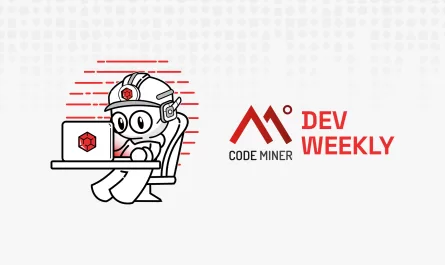HELLO EVERYONE!!! It’s April 25th, 2025 and you are reading the 58th edition of the Codeminer42’s tech news report. Let’s check out what the tech world showed us this week!
React Compiler RC – by Lauren Tan and Mofei Zhang
The React Compiler’s release candidate introduces automatic optimization for React apps. It transforms code to minimize re-renders, boosting performance effortlessly. Lauren Tan and Mofei Zhang detail its integration and benefits. Developers can now build faster UIs with less manual tuning. A significant step forward for React ecosystems.
How Node.js Works Behind the Scenes – by DeepIntoDev
Node.js powers fast, scalable applications using a single-threaded, event-driven model. Its non-blocking I/O leverages the V8 engine and libuv for efficient task handling. The event loop manages asynchronous operations, ensuring smooth execution. This article dives into Node.js’s internal architecture and performance optimizations. A must-read for developers seeking deeper backend insights.
Past, Present, and Future of Sorbet Type Syntax – by Jake Zimmerman
Sorbet, a type checker for Ruby, has evolved its syntax to balance flexibility and precision. Initially inspired by gradual typing, it now supports advanced features like union types. Jake Zimmerman explores Sorbet’s history and ongoing refinements for developer productivity. Future plans aim for seamless integration with Ruby’s dynamic nature. This post offers a clear lens into type system evolution.
How I Seeded a Million Records in Seconds (and You Can Too) 🪄 – by Vaitheeswaran L M
Seeding large datasets can be slow, but Vaitheeswaran shares a lightning-fast approach. Using optimized database techniques and batch processing, he seeded a million records in seconds. The article details tools like PostgreSQL and scripting for efficiency. Practical tips make it accessible for developers tackling big data. A game-changer for database performance enthusiasts.
How a 20 year old bug in GTA San Andreas surfaced in Windows 11 24H2 – by Silent’s Blog
A 20-year-old bug in GTA San Andreas resurfaced in Windows 11’s 24H2 update. Caused by a compatibility issue in the game’s rendering, it disrupted gameplay. The article investigates the bug’s origins and Microsoft’s response. This case highlights challenges in maintaining legacy software compatibility. A fascinating read for tech history buffs.
This custom property trick solves a common CSS problem – by Kevin Powell
Kevin Powell shares a clever CSS custom property trick to streamline layouts. It tackles a frequent issue with dynamic sizing in responsive designs. The video demonstrates practical examples for clean, maintainable code. Ideal for front-end developers aiming to enhance their CSS skills. Watch to simplify your styling workflow.
Coding as Craft: Going Back to the Old Gym – by Christian Ekrem
Christian Ekrem likens coding to craftsmanship, emphasizing deliberate practice. He advocates revisiting foundational skills to maintain coding fluency. The post reflects on balancing modern tools with core programming principles. It’s a thoughtful take for developers seeking mindful growth. A reminder to hone the craft regularly.
Event-Hidden Architectures – by Charles Zedlewski
Charles explores event-hidden architectures for modular, scalable systems. These designs decouple components, improving resilience and maintainability. The post dives into real-world applications and trade-offs. It’s a deep dive for architects designing distributed systems. A forward-thinking perspective on modern software design.
Supercharge Your Go Tests Using Fake HTTP Services – by Elliot Forbes
Elliot Forbes shares how to enhance Go testing with fake HTTP services. These mocks simplify testing by simulating API responses without real servers. The tutorial provides step-by-step guidance for reliable, fast tests. Ideal for Go developers aiming for robust codebases. Elevate your testing game with this practical approach.
Understanding Why COUNT(*) Can Be Slow in PostgreSQL.
Vaibhav Jha explains why COUNT(*) queries in PostgreSQL can lag. The operation scans entire tables, impacting performance on large datasets. He suggests optimizations like indexes and approximate counts for speed. This post is key for database admins seeking efficiency.
Languages, Tools & Framework releases
What’s New in Node.JS 24 – by Edy Silva
Edy Silva introduces exciting updates of the new Node.js 24, becoming the current release until October 2025, when it transitions to LTS. Key features include an upgrade to V8 13.4, enhancing JavaScript execution with new security and efficiency capabilities like Error.isError for reliable error checking. The URLPattern API, now global, simplifies URL validation and parsing, which is ideal for routing in frameworks like Express.js and much more. Check it out!
Storybook 9 is now in beta
Storybook 9’s beta release enhances UI component development with new features. It offers improved performance, better TypeScript support, and streamlined workflows. The update strengthens collaboration between designers and developers. Ideal for teams building reusable component libraries. Explore the beta to elevate your front-end process.
Bevy 0.16
Bevy 0.16, a Rust-based game engine, brings major updates for developers. New features include enhanced rendering and refining tools for 2D and 3D game creation. Perfect for game devs exploring Rust’s power. Dive in to build immersive experiences.
Announcing Hotwire Native 1.2
Hotwire Native 1.2 boosts hybrid mobile app development with Rails. It introduces smoother navigation and better offline support for iOS and Android. The update simplifies building responsive, server-driven apps. Great for Rails developers targeting mobile platforms.
Bot Filter: One-click bot protection now in public beta – by Vercel team
Vercel’s Bot Filter, now in public beta, simplifies bot protection for web apps. With one click, it blocks malicious bots while allowing legitimate traffic. Built on Vercel’s edge network, it ensures minimal latency and high accuracy. The feature targets developers seeking easy, robust security solutions. Test it to safeguard your site effortlessly.
mruby 3.4.0
mruby 3.4.0, a lightweight Ruby implementation, is now available. This release improves performance and adds new APIs for embedded systems. It maintains mruby’s focus on minimalism and portability. Ideal for developers working on resource-constrained environments. Check it out for efficient, small-scale Ruby projects.
—
And that’s all for this week! Wishing you all a great weekend and happy coding!
We want to work with you. Check out our Services page!



